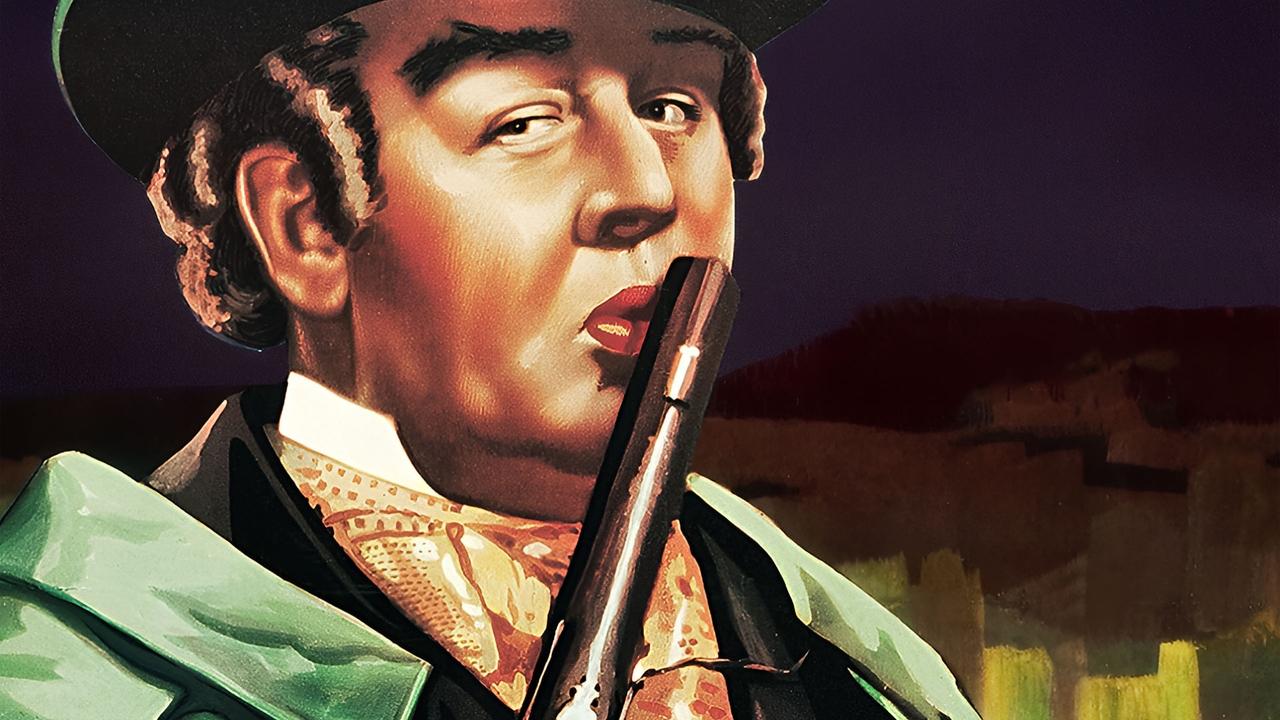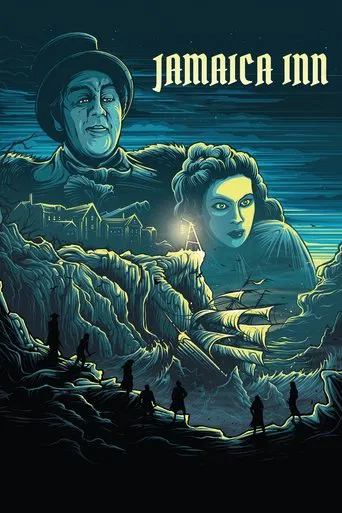

Very Cool!!!
... View MoreBlending excellent reporting and strong storytelling, this is a disturbing film truly stranger than fiction
... View MoreThe story, direction, characters, and writing/dialogue is akin to taking a tranquilizer shot to the neck, but everything else was so well done.
... View MoreI didn’t really have many expectations going into the movie (good or bad), but I actually really enjoyed it. I really liked the characters and the banter between them.
... View More2/4"You can't direct a Laughton picture. The best you can hope for is to referee."-Alfred HitchcockThis certainly rings true for this picture. Laughton owned the production company, funded the movie, and started as the villain. Hitchcock, at this stage, was just an on-call director who only got to carry out his visions to a certain extent.Due to Laughton having all of the power behind the scenes, he over acted as a silly antagonist and inconsistent with the mood of the story. While this played out very tounge-in-cheek, it turned our to be fairly entertaining.Laughton was reportedly so uncooperative with Hitchcock, that he eventually just gave up on the movie. This soiled the movie, as the twist was obvious after 10 minutes and some of the top-billed cast got next to no screen time in the midst of Laughton.After production was finished, Hitchcock left England for Hollywood, making Jamaica Inn his last British film. Whether this was purely coincidental or directly in retaliation to this movie is still unknown. While for Hitchcock, this is a pretty terrible movie, Laughton still entertains as one of early cinema's most memorable villains.
... View MoreAs you might know by now, I don't really like Alfred Hitchcock movies. However, I loved Jamaica Inn! It's a wildly exciting, swashbuckling adventure-not at all like the slow-paced internal mysteries of the '50s and '60s Hitchcock is best known for.The start of the movie shows a shipwreck caused by a nasty band of pirates, who, then, attack the survivors. It's a very creepy and effective scene. Next up, we see a seventeen-year-old Maureen O'Hara-in only her second leading role-arriving in the same town. She's there to stay with her aunt and uncle, Marie Ney and Leslie Banks, but before she can find their inn, she meets the wealthy squire Charles Laughton. I'd prefer not to tell you anymore of the plot, since it's incredibly exciting when you don't know what's going to happen, but if you like mysterious period pieces, twists and turns in your plots, or romance sprinkled into an adventure, you'll probably love this movie as much as I do.It's hard to believe this was Maureen O'Hara's third movie; in her first, she played an unnamed secretary. She's just as feisty and fierce as she was in The Quiet Man, nearly fifteen years later. She got this part because Charles Laughton saw her screen test and insisted on casting her as his leading lady! Charles is fantastic in his secretive, slimy role, and he'll keep you on your toes from start to finish. A young Robert Newton plays one of the pirates, long before he created the "original pirate" in Treasure Island. His role in Jamaica Inn is far different from Long John Silver, and while I won't give you any spoilers, if this is your first Robert Newton movie, you'll see him differently than everyone else. My dad first saw in this movie, and he said, "I can't imagine him playing Bill Sikes!" Again, no spoilers, but this is just another notch in Bobbie's belt of versatility.
... View MoreIf you read one of Hitchcock's biographies (or just the Truffaut interview in that book), the director didn't really care for or have a particularly great time making Jamaica Inn, an adaptation of Dapne Du Maurier's novel - albeit he might have made it in part to cozy up to Du Marier/her estate in order to make Rebecca, so in short it was worth it though - and it doesn't appear to be like that many other films he's made. It has some suspense but not in a way that seems as tightly calibrated in the mis-en-scene or in the pacing. And yet I probably enjoyed it more than many, in large part because it does become more interesting the more it goes on, and the identity of Charles Laughton's character to people around him (the Robert Newton character especially, an undercover officer basically) gets slippier.Supposedly the book was very different (Laughton's character was totally different), and of course this being Laughton he gets a full course of ham with his major-school villain. His whole thing is that he appears to be a sophisticated dandy, a high-society guy (or rather a wannabe deep down), and he gets his money by having a group of on-shore pirates arrange (somehow) to get ships ship-wrecked and then the gang goes to vandalize and take whatever loot is theirs. His usual plans get in some trouble when the niece of his main underling Joss (the late, achingly beautiful Maureen O'Hara in one of her first roles), and she starts to notice some funny things going on at this Inn she is told not to go to (initially, anyway).This is kind of a cat-and-mouse game and a story of an undercover cop (it's a period piece so he's not called that, but basically that's what he is), and the sort of damsel-in-distress caught in the middle. I'm glad O'Hara was cast in the film; I don't know if Hitchcock had the say or Laughton as producer, but she is really excellent at making Mary never seem like a victim, even when she gets tied up or bound/gagged. She looks like she can (and does) hold her own, and how she gets away from this gang at times, like on a rocky coast-line, is rather creative to see. She helps to make up the sort of serious, emotional backbone of the movie.Meanwhile, if you want a full load of Laughton, this is a good place to get it. I'm not even sure he's particularly *good* in the role, as far as selling me early on some of his line readings and such. But he really gets to have fun playing this duplicitous role of this uptight, foppish aristocrat (the kind that loves to get angry at his butler, see the scene at the top of the staircase where he knocks over a bunch of papers flying about), and then the brains of a criminal operation. As far as giving the audience a truly memorable, meaty, unapologetic and yet rather human villain, there's a lot to enjoy with him in the role, especially when he has to obfuscate who he is to the Robert Newton character (see his face when the man pulls out his badge/paper saying who he really is, it's a priceless piece of hammy acting).I can see why this is not looked at as one of the films people return to over and over again with Hitchcock, much less one of his better British films. It probably isn't - it's no 39 Steps or Sabotage or Lady Vanishes, and I might even like Man Who Knew Too Much a bit more - but for what it is, a thriller with lots of 'who IS this person' logic and the theme of trust being thrown about a lot, it succeeds. I liked that there was a relatively serious back-drop, with Mary's aunt being stead-fastly supportive of her husband Joss, even after she is told point blank that he is a criminal (she has to stay by her man and all, he's not all THAT bad, you know, despite how friggin dastardly and cunning Leslie Banks makes this character). And it all leads up to an actually intense climax on a ship that is about to pull away from port.So in short, its not something great overall, some of its predictable and the opening ship effects haven't dated well. But it is nothing short of fascinating to see Hitchcock work with a more conventional thriller that gets better the more the character dynamics get twisted with Laughton trying to hide who he is (sometimes in front of his own gang!)
... View MoreThe last film directed in England by Alfred Hitchcock, "Jamaica Inn" was produced, in part, by Charles Laughton.The story, adapted from a novel by Daphne Du Maurier, begins with a beautiful young woman named Mary (Maureen O'Hara) traveling by coach through a stormy night to meet her estranged aunt and uncle, who reside at Jamaica Inn--a place feared by outsiders. Her aunt Patience receives her with open arms, but Uncle Joss is a leering sort whose associates and business enterprises are suspect.Sir Humphrey Pengallan (Charles Laughton) is a landowner and the region's seat of justice. He represents refined, indulgent nobility. Laughton insisted that the size of his role be increased, effectively changing the film from a whodunit to a suspense film that is part character study. Hitchcock was disappointed, but I think Laughton was correct in casting himself as Pengallan rather than Joss (as originally planned) and then maximizing his role. Laughton's Pengallan is a complex character who displays cunning, eccentricity, and levels of mystery. Despite himself, Hitchcock delivers a film of atmosphere and style. He abstains from his usual cameo, but his hands are all over this moody work of suspense that was a box office hit.After the production of "Jamaica Inn", Laughton and O'Hara would go to Hollywood to produce the wonderful "The Hunchback of Notre Dame." Hitchcock would also be lured to Hollywood with the intention of creating a film about The Titanic, but instead would direct "Rebecca", an adaptation of another Du Maurier novel.
... View More